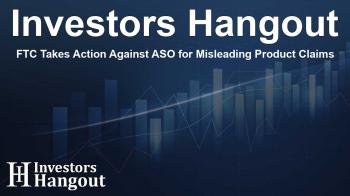FTC Takes Action Against ASO for Misleading Product Claims

FTC Takes Action Against ASO for Misleading Product Claims
In a recent development that has captured the attention of consumers and stakeholders alike, the Federal Trade Commission (FTC) has been prompted to intervene after ASO LLC failed to comply with advertising standards regarding its Hydrocolloid Gel Bandages. This has led to significant discussions about truthfulness in advertising and consumer protection.
The Background of the Case
Previously, the National Advertising Division (NAD) investigated ASO's claims that its Hydrocolloid Gel Bandages offered "2x faster healing." This assertion was challenged by Johnson & Johnson Consumer Inc. (JJCI), leading to a formal review. The NAD ultimately determined that ASO's claims lacked the necessary scientific support and called for their discontinuation.
ASO expressed a commitment to comply with the NAD's recommendations. However, a compliance proceeding was initiated by NAD in early 2025 due to concerns raised by JJCI regarding ASO’s actions. The ongoing investigation uncovered ASO's inadequate steps toward ensuring its advertising adhered to the recommendations.
ASO's Responses and Recommendations
ASO claimed that it would begin removing the disputed claims from its packaging once existing inventory was sold out, along with expressing concerns over third-party retailers' compliance. NAD reviewed ASO's actions and determined that while some online claims had been removed, non-compliant language persisted in other advertising avenues, specifically on third-party retail sites.
To address these issues, NAD made several key recommendations to ASO:
Third-Party Retailers
NAD urged ASO to promptly contact third-party retailers to rectify non-compliant claims still listed in product descriptions. It was imperative for ASO to work with these retailers to cease the spread of misinformation.
Product Packaging Changes
Furthermore, the NAD criticized ASO’s approach of waiting until current inventories were sold before altering packaging. They emphasized that immediate action should have been taken following the initial ruling. Alternative solutions, such as applying stickers over misleading claims, should have been implemented to ensure compliance in a timely manner.
Consequences of Non-Compliance
Despite these recommendations, ASO declined to implement the suggested changes, prompting the NAD to escalate the matter to the FTC and FDA. This referral is a critical step in promoting compliance among companies that may be misleading consumers through their advertising practices.
The implications of these actions resonate beyond just ASO. They highlight the importance of accountability in the marketplace and ensure that consumers are provided with accurate information regarding the products they purchase. With agencies like the FTC monitoring such claims, businesses may need to be more vigilant to avoid potential repercussions.
About BBB National Programs and NAD
BBB National Programs, as a non-profit organization, has been advocating for consumer trust in business practices for several decades. It oversees various programs aimed at ensuring fair advertising practices and resolving disputes in various industries. The National Advertising Division plays a pivotal role in reviewing advertising practices across multiple media platforms, ensuring that advertisements are truthful and beneficial for consumers.
For those interested in the broader implications of advertising standards in the health and wellness sector, it is essential to stay informed about the developments in this case, including the actions taken by agencies such as the FTC and FDA.
Frequently Asked Questions
What led to the FTC's involvement with ASO?
The FTC was involved after NAD referred ASO for failing to comply with its recommendation to stop making unsupported claims about its Hydrocolloid Gel Bandages.
What claim was ASO challenged on?
ASO was challenged on its claim that its Hydrocolloid Gel Bandages provide "2x faster healing," which was found to lack scientific support.
What recommendations did NAD make to ASO?
NAD recommended that ASO contact third-party retailers to remove non-compliant claims and immediately change product packaging instead of waiting for inventory to deplete.
What is the role of ABA National Programs?
BBB National Programs guides self-regulation in advertising, ensuring that claims made by companies are truthful and protecting consumer interests.
What happens next after the referral to the FTC?
The FTC will evaluate the matter further, which could lead to enforcement actions or guidelines for ASO and similar companies about their advertising practices.
About The Author
Contact Olivia Taylor privately here. Or send an email with ATTN: Olivia Taylor as the subject to contact@investorshangout.com.
About Investors Hangout
Investors Hangout is a leading online stock forum for financial discussion and learning, offering a wide range of free tools and resources. It draws in traders of all levels, who exchange market knowledge, investigate trading tactics, and keep an eye on industry developments in real time. Featuring financial articles, stock message boards, quotes, charts, company profiles, and live news updates. Through cooperative learning and a wealth of informational resources, it helps users from novices creating their first portfolios to experts honing their techniques. Join Investors Hangout today: https://investorshangout.com/
The content of this article is based on factual, publicly available information and does not represent legal, financial, or investment advice. Investors Hangout does not offer financial advice, and the author is not a licensed financial advisor. Consult a qualified advisor before making any financial or investment decisions based on this article. This article should not be considered advice to purchase, sell, or hold any securities or other investments. If any of the material provided here is inaccurate, please contact us for corrections.

